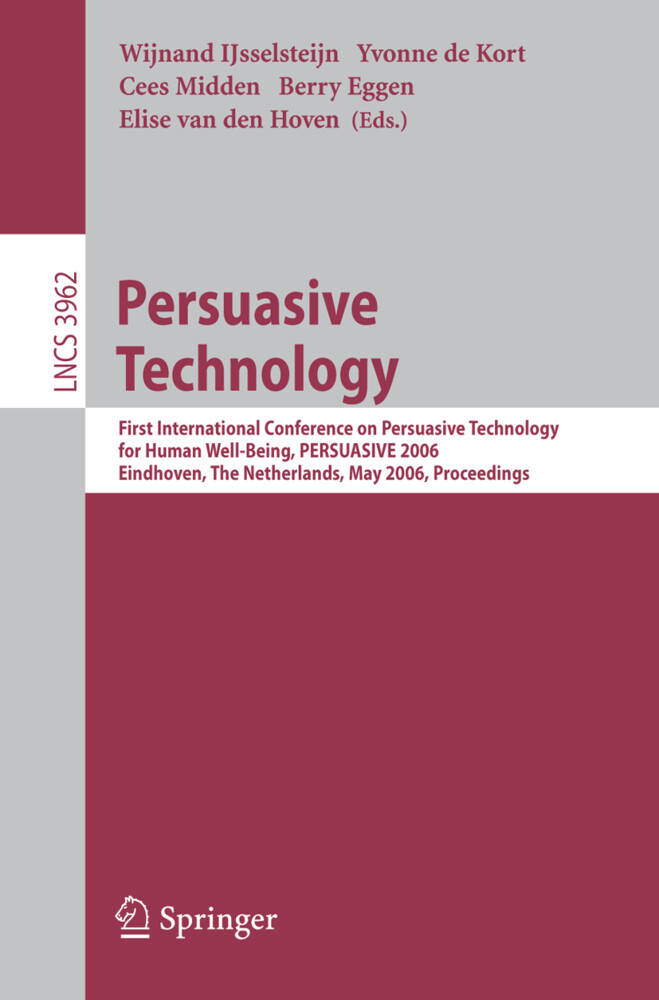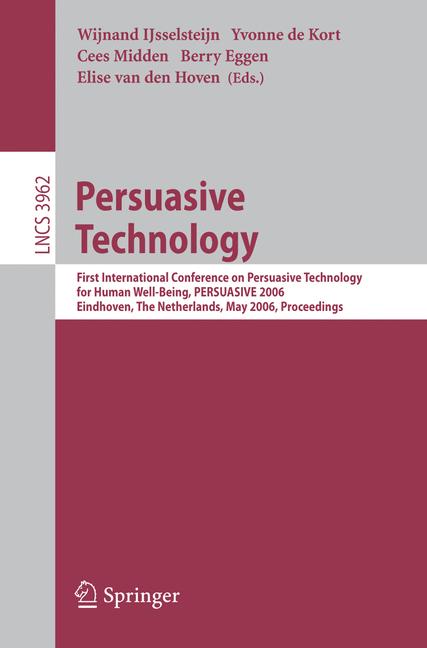
Zustellung: Mi, 23.10. - Sa, 26.10.
Versand in 3 Tagen
VersandkostenfreiBestellen & in Filiale abholen:
Persuasive technology is the general class of technology that has the explicit purpose of changing human attitudes and behaviours. Persuasive technologies apply principles of social psychology in influencing people; principles of credibility, trust, reciprocity, authority and the like. Social psychologists have spent a great deal of effort over many years in trying to understand how attitude and behaviour change comes about, focusing on the effectiveness of human persuaders, and the persuasive power of messages delivered through non-interactive mass-media, such as newspapers or television. Harnessing the persuasive power of current interactive media, persuasive technology was recently identified as a separate research field, as evidenced by B.J. 1 Fogg's first discussion of the domain. Fogg characterises computers designed to 2 persuade as the 5th major wave in computing . The scope of technologies that hold persuasive potential is broader than ICT alone, and includes persuasive product design and architectural design, yet the interactive nature of computers uniquely enables user-sensitive and user-adaptive responding, allowing persuasive messages to be tailored to the specific user in question, presented at the right place and at the right time, thereby heightening their likely persuasive impact.
Inhaltsverzeichnis
Persuasive Technology for Human Well-Being: Setting the Scene.- Persuasive Technology for Human Well-Being: Setting the Scene.- Psychological Principles of Persuasive Technology.- The Six Most Powerful Persuasion Strategies.- Changing Induced Moods Via Virtual Reality.- Technology Adds New Principles to Persuasive Psychology: Evidence from Health Education.- Persuasiveness of a Mobile Lifestyle Coaching Application Using Social Facilitation.- Cueing Common Ecological Behaviors to Increase Environmental Attitudes.- Persuasive Appliances: Goal Priming and Behavioral Response to Product-Integrated Energy Feedback.- The Persuasive Power of Mediated Risk Experiences.- Social Presence as a Conduit to the Social Dimensions of Online Trust.- Persuasive Technology: Theory and Modelling.- Feeling Strangely Fine: The Well-Being Economy in Popular Games.- Our Place or Mine? Exploration into Collectivism-Focused Persuasive Technology Design.- Persuasion Artifices to Promote Wellbeing.- Well-Being to Well Done! : The Development Cycle in Role-Playing Games.- Using Computational Agents to Motivate Diet Change.- Investigating Social Software as Persuasive Technology.- Towards an Architecture for an Adaptive Persuasive System.- Persuasive Technology: Design, Applications and Evaluations.- Persuasive Design: Fringes and Foundations.- The PowerHhouse: A Persuasive Computer Game Designed to Raise Awareness of Domestic Energy Consumption.- Break the Habit! Designing an e-Therapy Intervention Using a Virtual Coach in Aid of Smoking Cessation.- Persuasive Technologies in Education: Improving Motivation to Read and Write for Children.- Communication and Persuasion Technology: Psychophysiology of Emotions and User-Profiling.- Effect of a Virtual Coach on Athletes Motivation.-Self-management of Vascular Patients Activated by the Internet and Nurses: Rationale and Design.- Visualizing Energy Consumption of Radiators.- Ethics of Persuasive Technology.- Captology: A Critical Review.- Persuasive Gerontechnology.- Persuasive GERONtechnology: An Introduction.- Persuasive Technology for Leisure and Health: Development of a Personal Navigation Tool.- Persuasive Story Table: Promoting Exchange of Life History Stories Among Elderly in Institutions.- Persuasive Pillboxes: Improving Medication Adherence with Personal Digital Assistants.- Persuasive GERONtechnology: Reaping Technology s Coaching Benefits at Older Age.- Ambient Intelligence and Persuasive Technology.- perCues: Trails of Persuasion for Ambient Intelligence.- Biofeedback Revisited: Dynamic Displays to Improve Health Trajectories.- Erratum.- The PowerHouse: A Persuasive Computer Game Designed to Raise Awareness of Domestic Energy Consumption.
Produktdetails
Erscheinungsdatum
09. Mai 2006
Sprache
englisch
Auflage
2006
Seitenanzahl
236
Reihe
Information Systems and Applications, incl. Internet/Web, and HCI
Herausgegeben von
Berry Eggen, Wijnand Ijsselsteijn, Cees Midden, Yvonne de Kort, Elise Van den Hoven
Verlag/Hersteller
Produktart
kartoniert
Abbildungen
XII, 224 p.
Gewicht
365 g
Größe (L/B/H)
235/155/13 mm
Sonstiges
Paperback
ISBN
9783540342915
Entdecken Sie mehr
Bewertungen
0 Bewertungen
Es wurden noch keine Bewertungen abgegeben. Schreiben Sie die erste Bewertung zu "Persuasive Technology" und helfen Sie damit anderen bei der Kaufentscheidung.










